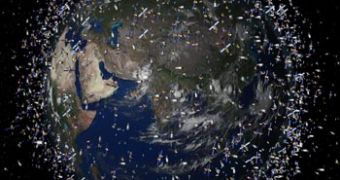The number of space objects that humans have created has grown a lot within the recent decades and will be exponentially increasing in the future. With all the planets and celestial phenomena that should be explored and observed, space missions (such as satellites and stations) are in bloom. Also, as overdue or unneeded devices are blown away, the resulting debris is added to the massive amount of objects floating in Earth's orbit. Thus, an international tracking system for space objects that could reduce risks for future missions is an urgent need.
Very similar to an air traffic control system, it would rely on data received by all companies involved in launching spacecraft at a present or past moment, centralized and managed by a private civilian institution in order to avoid any political issue. And there is already a lot of data to manage. According to an article published on Space, about 4,000 rockets and satellites (still functioning or not) are accompanied in Earth's orbit by about 6,000 large, monitored pieces of debris, as well as by over 200,000 tiny (a bit larger than 1 cm) but still potentially hazardous untracked objects. The velocity of these objects may often reach 17,500 mph (about 28,150 km/h).
Therefore, it is easy to see why a program built on previous related efforts and technology that would keep track of all these items is needed, since they threaten the safety of the International Space Station or the new launching shuttles or satellites. The first step into this task has already been made. The subject of the civil space situational awareness (SSA) has been recently discussed at the International Association for the Advancement of Space Safety.
According to Brian Weeden, Technical Consultant with the Secure World Foundation, “SSA is extremely important for military space, but there is a significant need for SSA in civilian space as well. This SSA system needs to work in an international context, much the same way as aviation does. But very few companies and states have the resources to fund and operate their own SSA network”.
Related to the technology and implementation issues, he added that “Much of the data needed is already being collected by various actors, from scientific institutions to multinational companies to backyard satellite observers. The difficulty is in breaking down the barriers between these disparate sources, making the different types and sources of data compatible, and distributing it in such a way as to protect the rights and privacy concerns of the different sources. It's definitely a challenge, but so far we haven't come across any insurmountable technical barriers”.

 14 DAY TRIAL //
14 DAY TRIAL //